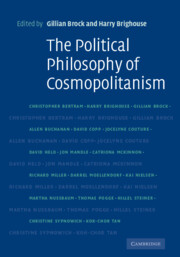Book contents
- Frontmatter
- Contents
- List of contributors
- Preface
- 1 Introduction
- 2 Principles of cosmopolitan order
- 3 Territorial justice and global redistribution
- 4 International justice and the basic needs principle
- 5 Cosmopolitans, cosmopolitanism, and human flourishing
- 6 Global justice, moral development, and democracy
- 7 A cosmopolitan perspective on the global economic order
- 8 In the national interest
- 9 Cosmopolitan respect and patriotic concern
- 10 Persons' interests, states' duties, and global governance
- 11 The demands of justice and national allegiances
- 12 Cosmopolitanism and the compatriot priority principle
- 13 Beyond the social contract: capabilities and global justice
- 14 Tolerating injustice
- 15 Cosmopolitan hope
- Bibliography
- Index
15 - Cosmopolitan hope
Published online by Cambridge University Press: 04 December 2009
- Frontmatter
- Contents
- List of contributors
- Preface
- 1 Introduction
- 2 Principles of cosmopolitan order
- 3 Territorial justice and global redistribution
- 4 International justice and the basic needs principle
- 5 Cosmopolitans, cosmopolitanism, and human flourishing
- 6 Global justice, moral development, and democracy
- 7 A cosmopolitan perspective on the global economic order
- 8 In the national interest
- 9 Cosmopolitan respect and patriotic concern
- 10 Persons' interests, states' duties, and global governance
- 11 The demands of justice and national allegiances
- 12 Cosmopolitanism and the compatriot priority principle
- 13 Beyond the social contract: capabilities and global justice
- 14 Tolerating injustice
- 15 Cosmopolitan hope
- Bibliography
- Index
Summary
The problems of the world cannot possibly be solved by skeptics or cynics whose horizons are limited by the obvious realities. We need men who can dream of things that never were and ask, why not?
(attributed to John F. Kennedy)… the world is not in itself inhospitable to political justice and its good. Our social world might have been different and there is hope for those at another time and place.
(Rawls, 2001, p. 38)Introduction
The term ‘cosmopolitanism’ denotes various interconnected projects. Many arguments in the literature raise doubts about the relevance of national and state boundaries to questions of justice: these questions connect with questions about the scope, assignment, and nature of cosmopolitan duties of justice. Cutting across these debates are discussions about the content of principles of global justice, raising questions about the universality of the values realized by these principles. And then there are various detailed questions about the nature of the institutions fit to deliver global justice.
These strands of cosmopolitan thought are important and flourishing. However, none of them directly addresses an objection to cosmopolitanism common outside of academic circles, which is that although the cosmopolitan ideal is acceptable in theory, it will never be realized in practice: cosmopolitans who hope for the realization of this ideal are well-meaning but deluded people who lack a proper grasp of how the realities of human nature and social interaction limit what is achievable in political practice.
- Type
- Chapter
- Information
- The Political Philosophy of Cosmopolitanism , pp. 234 - 249Publisher: Cambridge University PressPrint publication year: 2005
- 6
- Cited by

